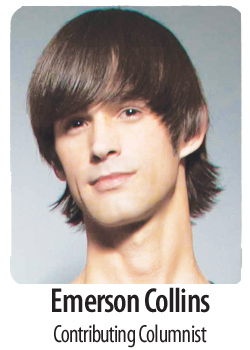Coming out is a right of passage both universal and unique
 Coming out is a right of passage for gay men and women — an experience as nearly universal as it is unique for each person. The process invariably began with the moment where the journey from self-discovery to self-awareness finally coalesces in self-acceptance and the readiness to speak the words. It began the first time we spoke the phrase “I’m gay” aloud to another human being.
Coming out is a right of passage for gay men and women — an experience as nearly universal as it is unique for each person. The process invariably began with the moment where the journey from self-discovery to self-awareness finally coalesces in self-acceptance and the readiness to speak the words. It began the first time we spoke the phrase “I’m gay” aloud to another human being.
Despite the shared experience, the nature of the journey is specific to each of us. Coming out stories run the gamut from those who kicked the closet door off its hinges in six-inch platform stilettos to those who cracked the door open just far enough to let in those nearest and dearest. A nearly infinite number of factors impact how we do it, when we do it, the words we choose, the people we share with and the choices we make once we were received.
That moment draws a line through our lives when our personal timeline suddenly has “Before Gay” and “After Gay” — our own internal birth which allows us to divide the important events, decisions and people on the calendar of our life by whether they happened B.G. or A.G.
For the most fortunate among us, it’s a line in the sand. But when the fury of the coming out storm dies down, love and acceptance smooth the sand again and the line is gone. Before Gay and After Gay are one journey with events and people running continuously from one into the other.
For others, the line between Before Gay and After Gay is more of barrier. It is a definitive boundary accompanied by varying levels of upheaval caused by certain kinds of ridicule or specific rejection. Coming out may have had traumatic elements, but the battle wounds healed with only some relationships damaged.
In the most extreme cases, the line is more akin to the Great Wall of China overlooking the Grand Canyon. This burn-the-ships scenario exists for those who received soul-crushingly negative reactions to coming out.
Rejection, specifically from family, and most egregiously when accompanied by religious shaming and judgment, have led some to march into our After Gay life away from the wall without looking back, like Bruce Willis in the action-iest of action movies. This reaction is particularly common in strongly religious and politically conservative families and communities. The Before Gay years go up in flames and take all of the people and places that existed there with them. It was a fire sale, and everything went.
There is great validity in taking the power away from those who could do and will do damage to a difficult journey into proudly loving ourselves both personally and publicly. If we remove the ability of those we know to reject us by nuking our relationships with them first, they cannot hurt us anymore. If it was world-endingly painful to come out to family or closest friends, the idea of being open to rejection from anyone else was inconceivable.
However, is it possible that some of us did ourselves harm by allowing the extremely negative reactions of some people to allow us to reject our Before Gay life entirely? The unintended result is that the scorched-earth approach left behind other people who would not have reacted so terribly. At the time, their good will may not have counter-balanced the horrible reactions of others, so they were, out of necessity, kicked to the curb as well. It was not worth the risk to separate a small amount of supportive wheat from a painful mountain of chaff.
Can we then, at some point further away from the trauma of a difficult coming out experience, look back and reconsider the wall we built to block out our Before Gay? And should we? It is certainly not an option for everyone. Some people have no wall. Some people have a wall separating them from people who proved to be entirely toxic. But some of us? Maybe some of us can consider that in choosing the nuclear option we needed then, we likely lost some wonderful people as collateral damage.
It may have been necessary, but that does not mean we cannot ever consider going back for those we might have kept. Our journey is never over, and it seems that it may be possible that one of the ways to sooth the scars from the earliest and most painful rejections can be to finally go back. Moving forward can benefit by looking backward. The strength and fortitude we gained in marching proudly away from those who judged us or shamed us or rejected us can allow us to consider tearing down some of the wall we once needed to cope and survive.
I chose the apocalyptic option as the result of being a boy who grew up in the Southern Baptist church where my entire social life revolved around church activities through high school before I attended Baylor. After college, living in New York City for a summer, I finally had a still moment alone, far from everyone I knew, to see and accept who I was. I did it, but I was not prepared to deal with the rejection of everyone I ever knew, and so I never gave them the chance. I froze them in time in my Before Gay life.
I needed a Great Wall and a Grand Canyon. However, I have grown in my outlook, perspectives and as a person since then. The result is that I am finally able to consider that those I left behind may have grown as well. Some of them may have surprised me back then, and likely more of them would surprise me today. I’m finally able to understand that I surely caused pain to others that I never realized when I walked away.
Maybe it is time to take some bricks off my own wall and reach back to see what I find. There may be some judgment and there may be some love, but I can handle either now. For my own continued growth, and dealing with the consequences, intended or not, of my own actions, I probably owe a few apologies I never considered before. Maybe some forgiveness as well.
What about you? How did you come out? Did you need a Game of Thrones-style wall of ice as far as the eye could see to love yourself regardless of the opinions of others? Do you still need all of it now? Or could you benefit from a Berlin-style celebratory teardown? It’s worth considering. There may be some things and people back in that closet still worth bringing out and putting back on. You won’t know who might still fit unless you look.
This article appeared in the Dallas Voice print edition August 22, 2014.


